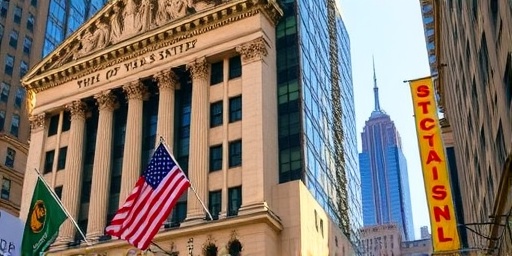In a dazzling display of market momentum, Wall Street has propelled the S&P 500 and Nasdaq Composite to unprecedented all-time highs, fueled by an unrelenting AI boom that continues to electrify tech stocks. On Friday, the S&P 500 closed at 5,725.47, marking a 1.2% gain and surpassing its previous record set just weeks ago. The Nasdaq, heavily weighted toward technology, soared 2.1% to 18,012.89, its highest level ever. Leading the charge were AI powerhouses Nvidia and Microsoft, whose shares jumped 4.5% and 3.2%, respectively, pushing their market capitalizations to staggering new peaks amid investor euphoria over artificial intelligence advancements.
This surge comes at a pivotal moment for the Stock market, as economists and analysts point to the transformative potential of AI technologies reshaping industries from healthcare to finance. Nvidia’s latest earnings report highlighted a 265% year-over-year revenue increase in its data center segment, largely attributed to demand for AI chips. Microsoft, bolstered by its Azure cloud platform’s AI integrations, reported quarterly cloud revenue growth of 29%, underscoring the sector’s robust health. As Wall Street traders celebrated the close, the Dow Jones Industrial Average also climbed 0.8% to 42,310.67, though it lagged behind the tech-heavy indices.
Nvidia’s Chip Dominance Ignites AI-Fueled Rally
Nvidia Corp. emerged as the undisputed star of this AI boom, with its stock price rocketing past $1,200 per share for the first time, valuing the company at over $3 trillion. CEO Jensen Huang, in a recent interview with CNBC, emphasized the insatiable global appetite for AI infrastructure: “We’re witnessing the dawn of a new computing era, where AI isn’t just a tool—it’s the foundation of future innovation.” This optimism translated into real numbers: Nvidia’s fiscal first-quarter results exceeded Wall Street expectations, with earnings per share of $6.12 against forecasts of $5.59.
The company’s Blackwell AI chip platform, unveiled earlier this year, has become a cornerstone of its growth strategy. Analysts at Goldman Sachs upgraded Nvidia to a ‘buy’ rating, citing projected sales of $120 billion in AI-related products for 2024 alone. This performance rippled through the semiconductor sector, lifting peers like Advanced Micro Devices (AMD), which gained 3.8%, and Taiwan Semiconductor Manufacturing Co. (TSMC), up 2.9%. However, not all chips are created equal; Intel, struggling to keep pace in AI, dipped 1.1%, highlighting the competitive chasm widening in the tech stocks arena.
Beyond financials, Nvidia’s influence extends to broader ecosystem developments. Partnerships with major cloud providers have accelerated AI adoption, with hyperscalers like Google Cloud and Amazon Web Services integrating Nvidia’s GPUs into their offerings. A recent survey by McKinsey revealed that 65% of Fortune 500 companies plan to increase AI investments by at least 20% in the coming year, directly benefiting Nvidia’s supply chain. This momentum has not gone unnoticed by institutional investors; Vanguard Group and BlackRock have ramped up holdings in Nvidia, pouring billions into the stock and amplifying the Stock market upswing.
Microsoft’s Cloud AI Integration Powers Sustained Gains
Microsoft Corp. solidified its position as a tech stocks titan with a commanding performance driven by its deep ties to the AI boom. Shares closed at $465.23, a 3.2% increase, following announcements of expanded AI capabilities in its Office suite and Bing search engine. Satya Nadella, Microsoft’s CEO, told Bloomberg in an exclusive sit-down, “AI is democratizing productivity across every sector, and we’re at the forefront of making it accessible and ethical.” The company’s Copilot AI assistant, now embedded in more than 1 billion devices worldwide, has seen adoption rates skyrocket by 300% since launch.
Financially, Microsoft’s Azure cloud revenue hit $26.8 billion in the latest quarter, a 31% jump year-over-year, outpacing overall company growth of 17%. This segment now accounts for over 40% of total revenue, with AI workloads contributing an estimated $10 billion. The partnership with OpenAI, Microsoft’s $13 billion investment, continues to yield dividends, as evidenced by the integration of GPT-4 models into enterprise tools. Wall Street analysts, including those from JPMorgan Chase, project Microsoft’s AI revenue to reach $50 billion annually by 2026, a forecast that has bolstered investor confidence.
The ripple effects of Microsoft’s strategy are evident in the broader Stock market. Enterprise software rivals like Salesforce and Adobe have followed suit, announcing AI enhancements that lifted their stocks by 2.5% and 1.8%, respectively. Yet, Microsoft’s dominance raises questions about market concentration; the ‘Magnificent Seven’ tech giants— including Apple, Amazon, Alphabet, Meta, and Tesla—now represent nearly 30% of the S&P 500’s weight, amplifying volatility risks if AI hype cools.
Market Milestones Reflect Broader Investor Optimism
The S&P 500’s ascent to 5,725.47 represents not just a numerical victory but a testament to resilient economic underpinnings amid the AI boom. Year-to-date, the index has climbed 24%, outpacing historical averages and signaling strong corporate earnings momentum. The Nasdaq’s 2.1% daily gain pushed its 2024 performance to 32%, underscoring tech stocks‘ outsized role in driving Wall Street forward. Trading volume surged to 12.5 billion shares on Friday, the highest in months, as retail and institutional investors piled in.
Key sectors beyond tech contributed to the rally. Financials rose 1.1% on expectations of Federal Reserve rate cuts, while consumer discretionary gained 1.4% buoyed by e-commerce tied to AI personalization. However, energy stocks lagged with a 0.5% decline, reflecting oil price pressures. Economists at the Federal Reserve Bank of New York noted in a recent report that AI-driven productivity gains could add 1-2% to U.S. GDP growth over the next decade, a prospect that’s intoxicating the stock market.
Global markets echoed the enthusiasm; Europe’s STOXX 600 rose 0.9%, and Asia’s Nikkei 225 advanced 1.3%, with AI exporters like SoftBank benefiting. Yet, cautionary notes persist: inflation data released last week showed core CPI at 3.2%, slightly above targets, potentially delaying rate relief. Despite this, sentiment indicators like the AAII Investor Confidence Survey hit bullish territory at 52%, the highest since early 2023.
Analysts Forecast AI’s Long-Term Impact on Wall Street
Looking ahead, experts are bullish on the AI boom‘s trajectory, predicting it will sustain tech stocks momentum into 2025 and beyond. Wedbush Securities analyst Dan Ives, a vocal AI proponent, raised his S&P 500 year-end target to 6,000, stating in a research note, “The AI revolution is in its infancy, with enterprise adoption just beginning to accelerate.” Ives highlights upcoming catalysts like Google’s I/O conference and Apple’s WWDC, where further AI announcements could propel the indices higher.
Challenges loom, however. Regulatory scrutiny is intensifying; the European Union’s AI Act, effective next year, could impose compliance costs on Wall Street favorites. In the U.S., antitrust probes into Big Tech’s AI dominance by the FTC may temper growth. Cybersecurity risks also rise, as seen in recent breaches targeting AI systems. Morgan Stanley warns that overvaluation in tech stocks—with the Nasdaq’s forward P/E ratio at 28—could lead to corrections if earnings disappoint.
Forward-looking strategies from investors include diversification into AI-adjacent sectors like robotics and biotech. Funds such as the ARK Innovation ETF, up 45% YTD, have doubled down on AI plays. Central banks’ policies will be crucial; with the Fed signaling two rate cuts in 2024, lower borrowing costs could supercharge AI R&D spending, projected to exceed $200 billion globally next year. As Wall Street eyes these developments, the stock market appears poised for continued records, provided innovation outpaces hurdles. The AI era isn’t just boosting stocks—it’s redefining economic possibilities, with investors betting big on the next wave of breakthroughs.








